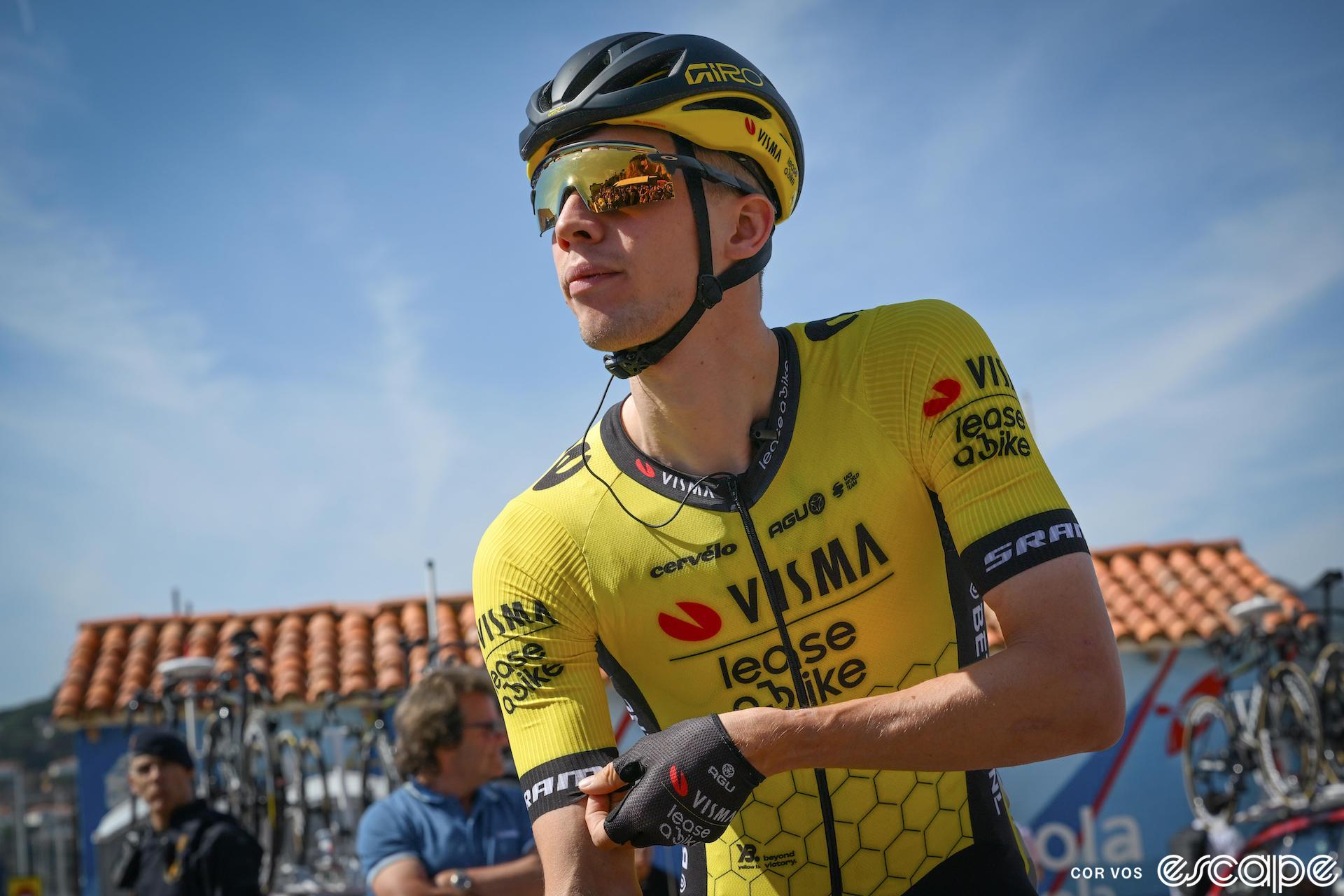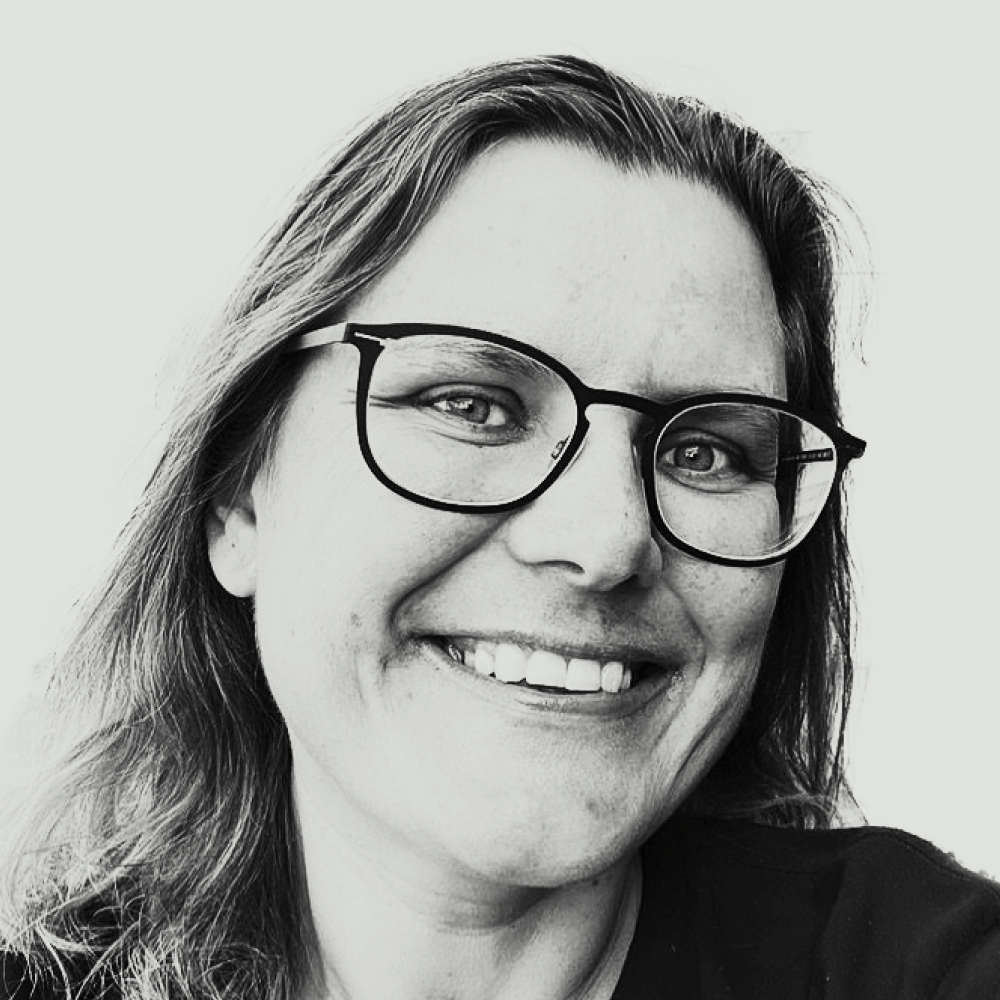Among all the rookies making their debut on the WorldTour in 2024, few had a more winding path to the pros, or a better first month, than Bart Lemmen.
Lemmen, who is 28, first pinned on a race number for Team Visma-Lease a Bike in the Tour Down Under this year. He finished fifth on the Willunga Hill stage, fourth on Mount Lofty and netted a fifth place overall – just behind highly touted fellow rookie Isaac del Toro. In the UAE Tour, his second World Tour stage race ever, the Dutchman added another top ten place. “I rode in support of Milan [Vader] in Down Under and had a free role in UAE. To get these results already is something neither me nor the team expected so soon.”
So soon might be an interesting phrase given that it’s not uncommon today to find 19- and 20-year-olds racing in the WorldTour today and occasionally getting results. But Lemmen is not your standard pro rider coming through the youth, junior, and U23 ranks to a place in the WorldTour. He started his career in the Dutch Air Force and only raced his first races when he was 22 years old.
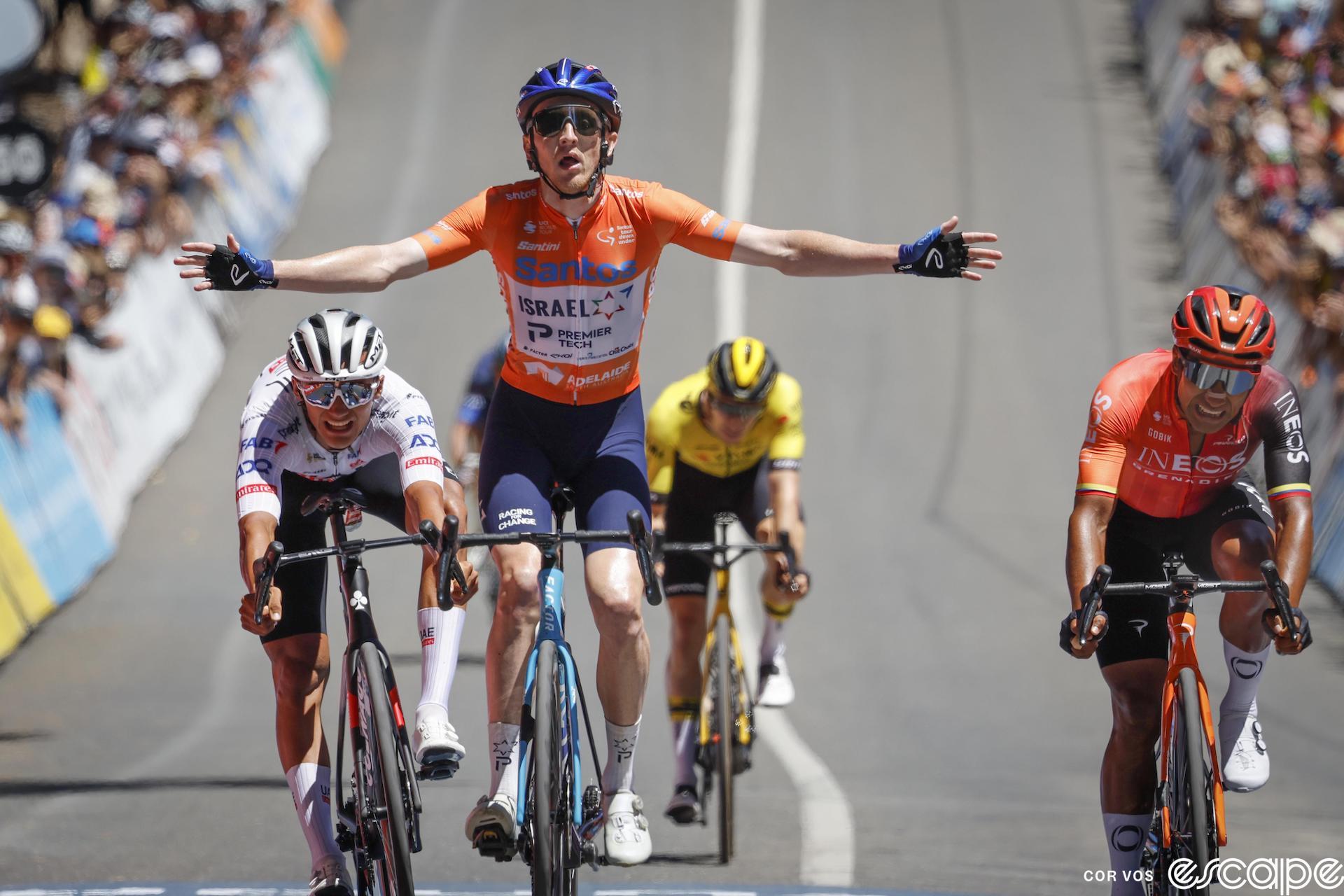
After his early strong results, Lemmen got another, less-welcome initiation rite of sorts at the Tour of Catalunya, where he crashed and broke his collarbone on stage one. “I recovered well from the crash, but it was a painful experience because I also needed surgery,” he says with a smile. “The bone was in five pieces, and I think there are 13 screws in it now.”
“It’s not only the [broken] bone, but you also have the tissue damage plus the tendons that got hit. It was my biggest crash to date. I already got myself dropped so I was just riding to the line without taking risks but there was a tree root or bump in the road. I don’t even know how it happened, but I was launched into the air at high speed.”
There have been many crashes in the peloton lately. Lemmens’ teammates Wout van Aert and Jonas Vingegaard were severely injured in crashes at Dwars door Vlaanderen and Catalunya and will be out for quite some time. Lemmens got off with ‘just’ a broken bone.
“I said to my girlfriend before going to Spain that it was an illusion that I would never crash in my cycling career. I won’t state that it’s part of the sport because that’s too easy, but it is inevitable. You can think of a million safety measures, but crashes will always happen. I was just unlucky. It wasn’t even a crash in a race situation because I was already dropped. It could have happened in training too. I also don’t think I crash easier because I started later. I am no [Tom] Pidcock or [Matej] Mohorič who win races on a descent but let’s be honest, that goes for most riders.”
Lemmens started in the sport at an age where he normally wouldn’t even be on the radar of pro teams anymore. He was an athletic child who did many sports like gymnastics, korfball, football, tennis, and track and field. When he ran a fast 10 km at 17 years old, he joined a talent group but had to quit when he went to the Royal Military Academy, the KMA, in Breda.
“The military was always a thing in my family because my grandfather spent his working life there. I initially wanted to be a pilot but didn’t make it through the tests. At the KMA we did sports like a speed march where you have a 10-kilogram pack plus your own weapon. As a group you also transport a big weapon weighing 10-12 kilos. That is hard work but there was not a lot of time for other sports,” Lemmen says with a broad smile.
“After the KMA I joined a platoon at the Volkel airbase as commander. It appealed to me to lead a team, to work together. I am always more about doing things than thinking up things. In that respect it’s not much different than my life now,” he adds.
It was while still studying at the KMA Lemmen started cycling: First at local criteriums and then at club level doing national races. Lemmen identifies two important moments that got him on the path to a pro cycling career.
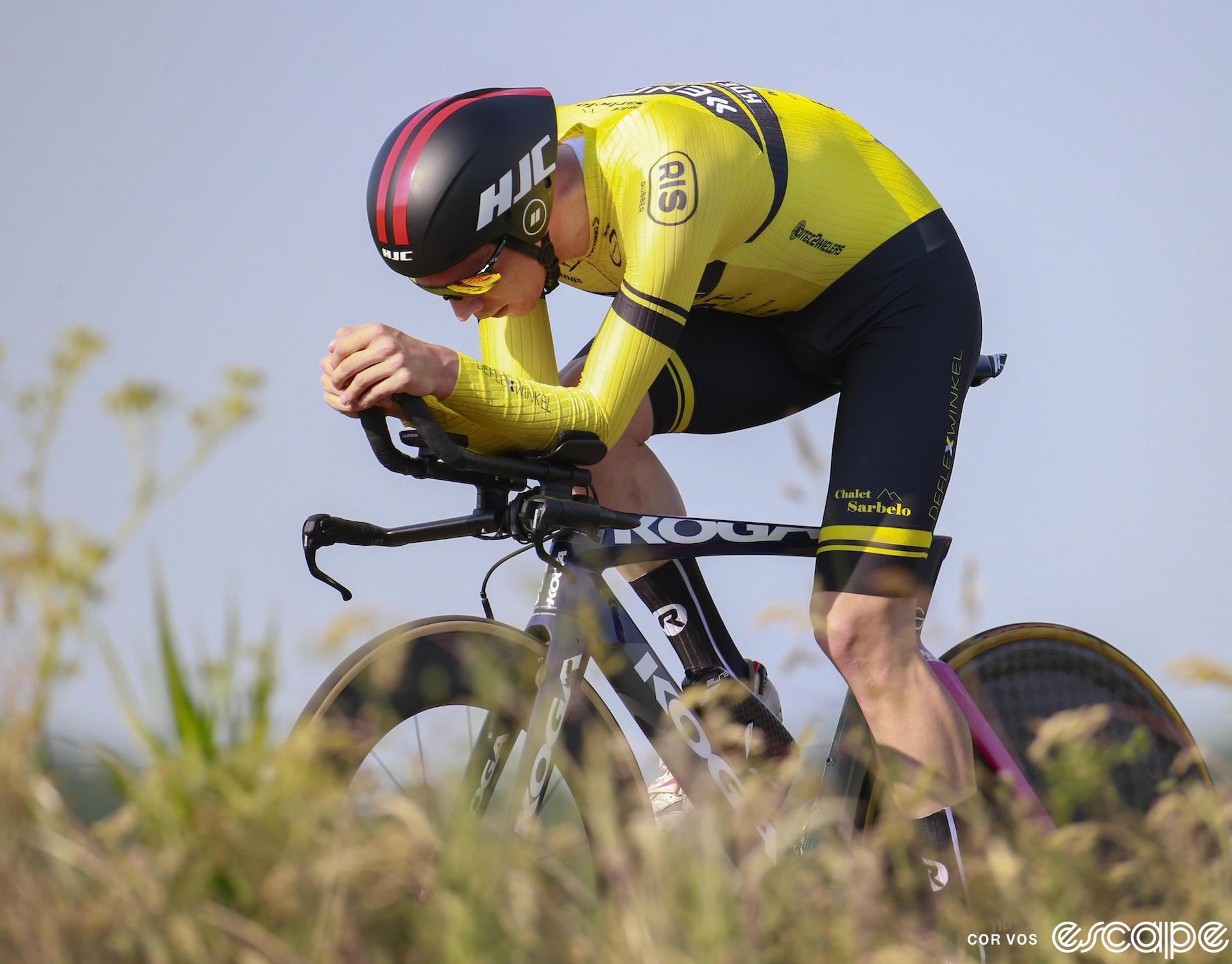
“In 2021 I started riding some more, got myself a good bike fit, and entered the national time trial championships. I came in eighth in a strong field. I thought to myself: ‘That’s decent.’” National club-level races followed with the West-Frisia cycling club, and an encouraging win in the Eurode Omloop [a hilly race in Limburg]. “I felt I had the talent to ride at Continental level,” he said, and VolkerWessels, which offered him a contract for 2022, agreed. “I was better than average, but racing is also about being lucky sometimes, or rather not be unlucky. The results didn’t come straight away.
“My first UCI pro race was Volta Limburg Classic where I came in 10th. It came after a weekend where we had been to Germany for training with my platoon. We had some beers, and I rode maybe two hours. That was another eye opener, to get a result like that with minimal preparation. That year I also won a stage in Kreizh Breizh and in the post-Tour pro kermesses in Belgium I raced against the WorldTour pros for the win. I thought that if I could do that after spending the day before at work, or doing weekend or night shifts, there is more in this sport.”
In 2023 Lemmen stepped up to the ProTeam level, joining Human Powered Health team, and got some good results in O Gran Camiño, the Tour of Norway, and the Tour of Belgium. An aggressive ride that netted fourth place in the national road championships made people notice him some more. He followed it up with solid results in the Basque Country, France, and Slovakia. But Human Powered Health folded its men’s side to focus on its WorldTour women’s squad, and Lemmen had to find a new place. Ending up at Visma-Lease a Bike, the team that just completed the Grand Tour trilogy, was not something he expected.
“My management contacted many teams including Visma-Lease a Bike. There was another way they noticed me and that was through my friend Kai Reus [2003 junior world champion]. He had been texting Merijn Zeeman [lead director, who will leave at the end of the season] since that eighth place at the [2021] nationals. I never deemed it realistic to sign with the best team in the world but when the Quick Step–Jumbo merger didn’t happen, it all went fast. I was driving home from the Munich Oktoberfest when they told me Merijn wanted to talk. In 24 hours, we had a contract. There was some time pressure because they had to hand in the lists to the UCI. The market had come to a standstill with the merger rumors so when that was cleared, it happened fast.”
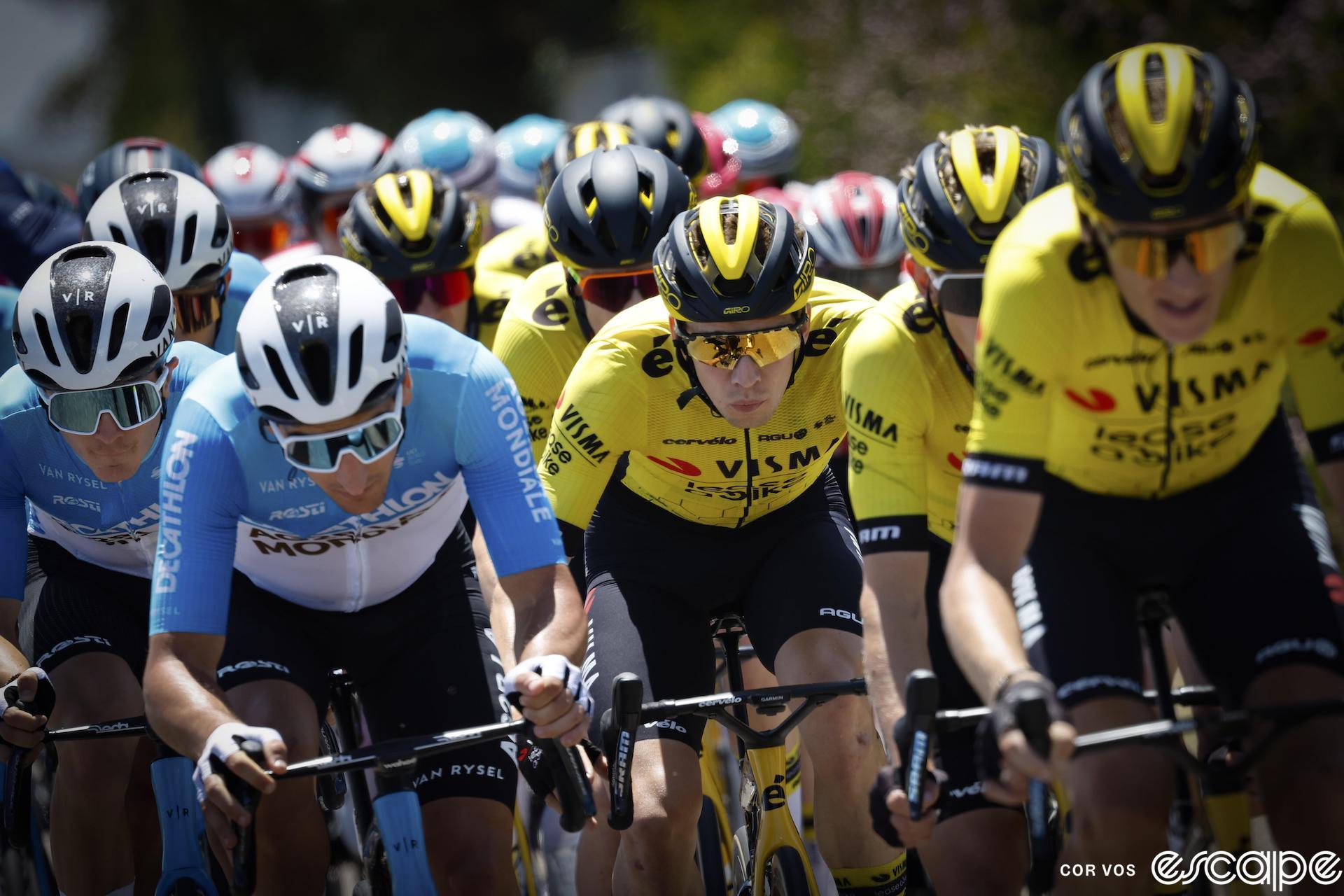
Lemmen says he is a rider who – despite being on the bike only a handful of years – had a good education in the Netherlands.
“I will be honest that flat races are not my specialty because I need some elevation. I am too light for the flat races but have some explosiveness that helps me get in echelons.” Racing in the Netherlands was important, he says, because “you learn how to race here when you are not the strongest but have to fight for your place. Riding in Belgium is more relaxed. When there is a race in the Netherlands with 170 guys at the start, 165 of them think they can win,” he laughs.
Coming into the sport later, he sees the trend to sign new riders younger and younger. He is passionate to make a case for the older riders.
“After Human Powered Health ended there were offers but also reluctance from teams because of my age. The best team in the world did see the potential based on the same numbers everyone saw. I think I proved them right.
“I don’t think you should dismiss riders based on age too soon. I believe in statistics. The chance you make it after the U23 years are slim, but they are not zero. There are guys who need a bit more time. In the Netherlands we already have Marijn van den Berg, Sjoerd Bax, Frank van den Broek, Arvid de Kleijn and me. That’s just here alone. It’s just too easy to say that if you haven’t made it at 23 it will not ever happen.”
“I would also like to add that pro cycling is not easy. There are many things you need to learn. I had the gradual learning curve with local crit races, national classics, some smaller stage or one-day races and now WorldTour. I am not a fan of every talented 18-year-old going WorldTour right away. There is not a lot of margin for error in the WorldTour. It’s always on. In a development team there is more room to learn. That gradual learning curve is sometimes better for a rider.”
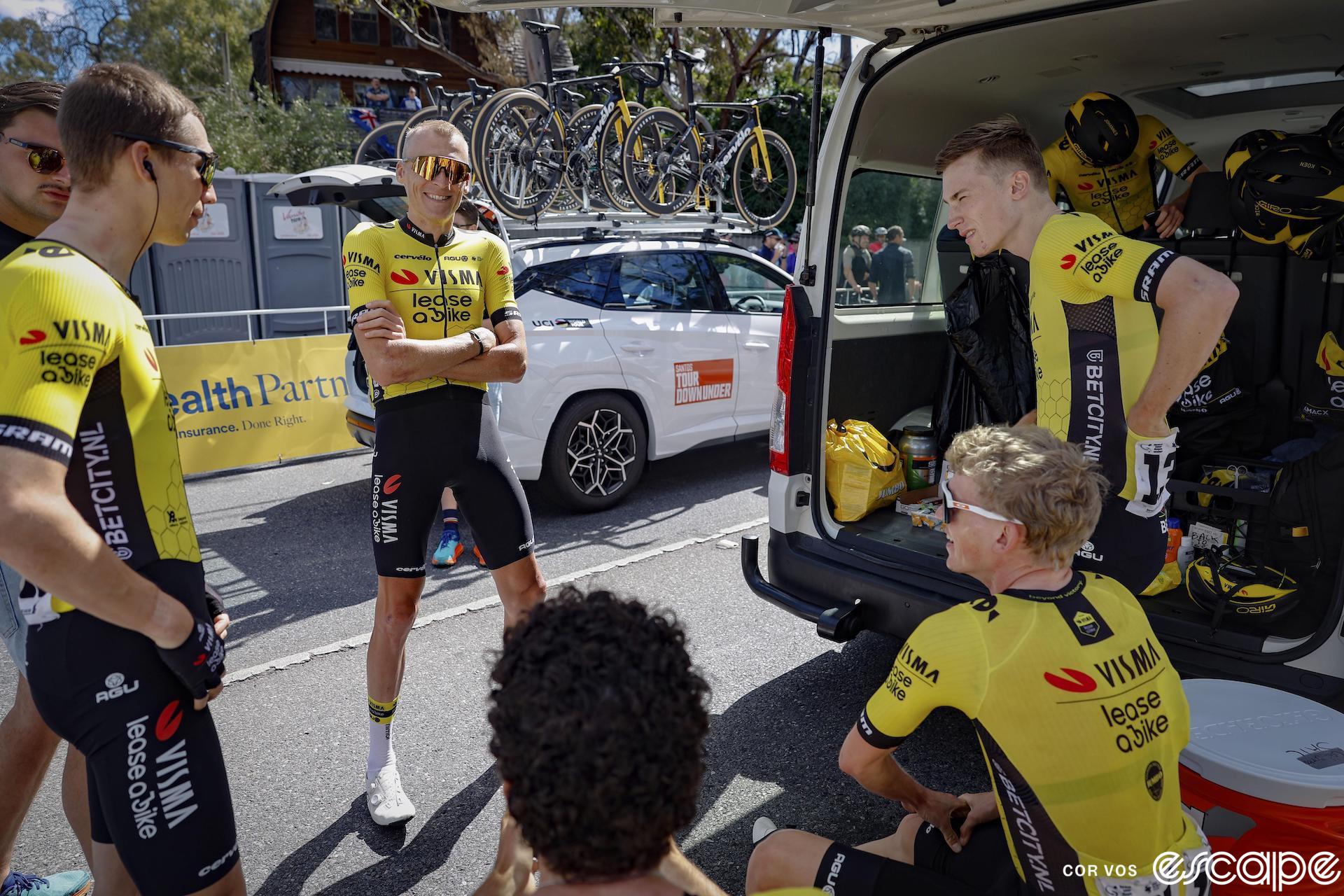
Visma-Lease a Bike have a lot of confidence in the abilities of the 28-year-old Dutchman. They gave him a hard programme to start with mostly WorldTour races.
“I was supposed to race Catalunya, Basque Country, then Amstel Gold Race, Flèche Wallonne plus Romandie. That is a big ask,” he says. “Now I will do Romandie, Veenendaal-Veenendaal, Ronde van Limburg, and Tour of Norway in May before Tour de Suisse in June.”
What does he think is possible?
“I won’t speak about concrete goals this year. The team believes I can do this. I just do my job the best way possible and then we see what the level is. No one expected it to go so well right away. It is nice and I am proud of how I am doing. I am in the right place here. I can focus on the process and let the thought of getting results go a bit. Last year it was more about getting results because I wanted to take that final step. Now I am here, and it feels more relaxed.”
There is wide variety in races for Lemmen this year in what he considers a formative year. He wants to perform the task the team asks and be the team player he also was in his military days. Secretly he does harbour ambitions though.
“Riding the Amstel Gold Race is a dream so it’s rough that didn’t happen this year. I have always loved racing in Limburg. It’s where I found my love for the sport and never finished outside of the top 10. I would also love to ride the World Championships or become national champion with the jersey that comes with it.”
On a team that has Grand Tours in its DNA, Lemmen initially leaves that out when summing up his ambitions, but it doesn’t mean it’s not there.
“On this team only 15-16 riders are on that list for a Grand Tour spot, and I need to fight for my place there. I would still consider myself a fully-fledged WorldTour rider when I never got to do a Grand Tour, but a Grand Tour is what makes a rider’s dream. My career would not have failed without one, but it would be a dream come true if I get to line up for three weeks in France, Italy, or Spain.”
What did you think of this story?

